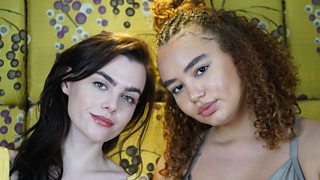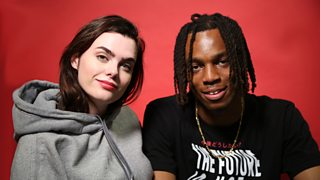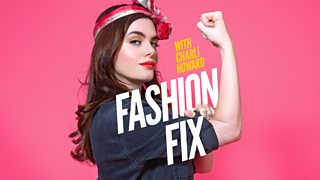Six things we learned about the fashion industry
Fashion Fix with Charli Howard has been investigating the fashion industry and figuring out what makes ethical dress sense for people and planet. Along the way we've discovered some unexpected stuff about the industry. Here are just six of the things that model and presenter Charli Howard has uncovered.
1. Some models wear padding to make them look fatter
Charli spoke to plus size model (and mate) Sonny Turner and they shared their experiences of working as models. Sonny is a UK size 16, which is the average UK dress size but is "plus size" for a model.
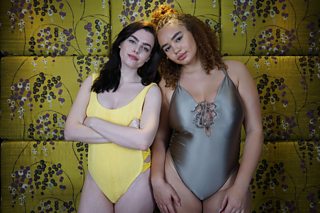
Discussing the use of plus size models, Sonny is blunt. "They like to be diverse but not too diverse," she says. "They want bigger girls but they only want the girls to have bigger legs, bigger hips, bigger boobs, but they don’t want a bigger face." So agencies use thinner models wearing padding on the parts of their bodies that are covered up – "circles you put down the side of your trousers to make yourself look bigger," as Charli recalls from her own experience.
"We’re used to represent size 22 women, but that’s not representative of them at all," says Sonny.
2. Modest fashion is a multi-billion dollar industry
Charli meets Muslim model Mariah Idrissi who became one of the first models to wear a hijab in a mainstream fashion campaign when she modelled for H&M back in 2015. Mariah explains that modest fashion is a growing trend for fashionistas who choose to cover up. "Modest fashion is just a way of life," explains Mariah. "It's nothing exclusive to a particular religion or faith; it's just a lifestyle choice. If you want to dress more modestly, that's fine, you don't have to have any reason to do it. But for me as Muslim it is also a part of my faith as well to dress modestly."
3. You can buy old clothes in new packaging all for the joy of 'unboxing'
The phenomenon of unboxing videos, in which people film themselves unpacking the things they've bought then post their videos online, is loved by millions. But Charli discovers a sub-genre of unboxing when she meets online re-seller, stylist and entrepreneur Bella McFadden, AKA internetgirl.
Bella has built a business selling vintage clothing via online resales site Depop, but she also sells specially-selected bundles of clothing that she boxes up for her customers. They then get to enjoy the fun of unboxing but, because the clothes are second-hand, there's much less waste. Bella's bespoke bundles have even spawned their own unboxing hashtag on YouTube.

4. The pre-aged look of your denim jeans could be harming the workers who make them
The trend for jeans which look like they've already been worn is not new, but the techniques used to make them cause harm which many do not know about. Charli meets fashion journalist and author Tansy Hoskins who explains some of the problems. Popular among the processes is sandblasting the denim, but this can lead to serious respiratory problems for factory workers.
"Sandblasting is incredibly dangerous, because it creates tiny little particles of dust and silica," explains Tansy. "If you go to these factories, even today, some people are given masks and some people aren't. The workers inhale whatever dust is in the air: it's just going directly into their lungs."
In many countries, such as Egypt, Pakistan, Bangladesh and China there is very little regulation protecting workers, but even where there is regulation alternative methods have their own issues. Since regulation was introduced in Turkey, the chemical compound potassium permanganate is washed into the jeans to create the look. But as Tansy explains, it can be "really dangerous for workers' skin". Other methods, such as the hand-sanding common in Vietnam can also create harmful dust, while the more traditional stone-washing of jeans is incredibly water intensive.
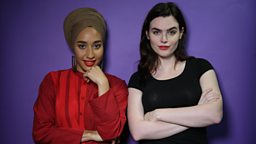
5. The problems of microplastics is only the start - there are even smaller plastics we haven't yet been able to measure
Microplastics - tiny particles of plastic debris often coming off material used for clothes - have been hitting the headlines in recent years as a major pollutant of the environment. That's thanks in no small part to the work of Dr Mark Browne, an ecologist and senior lecturer working at the University of New South Wales in Australia, who has been studying them for many years.
Charli talked to Mark who revealed that as measuring instruments become more precise, even smaller plastic pollutants will be revealed. "Our instruments are starting to look at even smaller particles, things that are nanometres in size. We haven't got instruments yet to look at things that are picometres in size," he explains, referring to measurements a billionth and trillionth of a metre long. "We're talking a lot about microplastics right now, when our instruments get better we'll start talking about nano- and then we'll start talking even smaller. The take home message for listeners is really that products we use every day break down into smaller and smaller items, and those can cause problems."
6. Some stylists and photographers work for commercial brands under pseudonyms
Charli talks with Giulia Mensitieri, an anthropologist who has written a book exposing low pay in high fashion. She explains how people such as stylists and photographers are often poorly paid, paid in goods, or even not paid at all, when working for high-end luxury brands. Some make up the shortfall in earnings by taking work with big commercial brands, but do so pseudonymously because, as Charli puts it, "it will stop you from getting work" with the more illustrious brands (who don't pay).
"There is a kind of rule that [the] more a job is valuable for your career, the less it will be paid," says Giulia. "Which is a paradox because we have to remember that fashion is one of the most rich and powerful industries in the world."
Catch up with all episodes of Fashion Fix with Charli Howard on 麻豆社 Sounds.
Listen on 麻豆社 Sounds...
-
![]()
Body Positivity with Sonny Turner
Charli sets off on her mission to fix fashion with a look at body image.
-
![]()
Sustainable Streetwear with Emmanuel Enemokwu
Charli discovers a new breed of sustainable brands.
-
![]()
Modest Fashion with Mariah Idrissi
Charli meets the model who made modest fashion mainstream.
-
![]()
Subscribe to Fashion Fix with Charli Howard
Get the latest from Fashion Fix on 麻豆社 Sounds.
